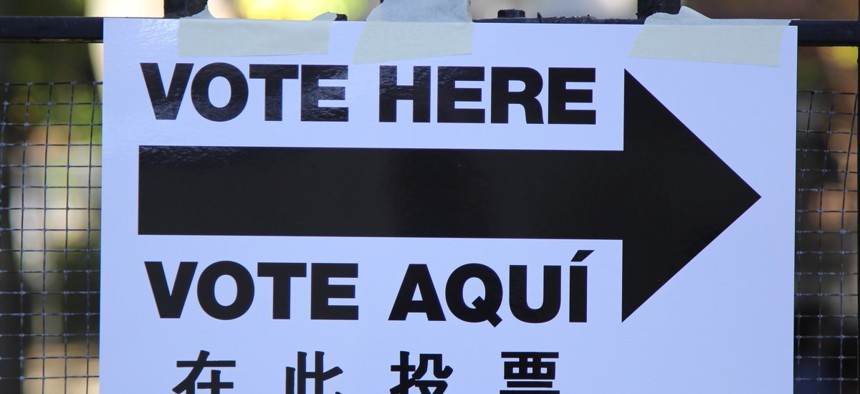Connecting state and local government leaders
In Colorado, “numerous checks and balances for access and integrity” in the voting process make allegations of widespread corruption specious.
DENVER — Despite research that shows that most allegations of voter fraud in U.S. elections are baseless , Republican presidential nominee Donald Trump has made headlines in recent days by making unsubstantiated claims that the current elections are “rigged” against him in favor of Democrat Hillary Clinton.
Elections administrators in state and local governments, including many elected Republican secretaries of state , have come out to counter Trump’s accusations about the integrity of the voting process. Trump’s critics warn that the use of such highly-charged language could signal that the GOP nominee may not concede should he lose the November election for the White House which could potentially spark unrest among his supporters or a constitutional crisis.
“[T]here's no evidence of any systemic fraud, which is essentially what's being suggested,” Ohio Secretary of State Jon Husted, a Republican, said Monday on National Public Radio’s “All Things Considered. ”
A Politico/Morning Consult poll released Monday showed that 41 percent of voters feel that November’s elections could be “stolen” from Trump .
“If you keep being told over and over and over that something is hacked even though it isn’t, some people might start believing that. So yes, I do take it seriously,” Iowa Secretary of State Paul Pate, a Republican, told the Los Angeles Times .
Elections administrators and public officials have their work cut out for them trying to ease fears of a corrupted voting process.
In Colorado, county clerks released an open letter to voters on Monday defending the integrity of elections in the Centennial State. The message from those local officials: It’d be extremely difficult to rig an election in Colorado because of “numerous checks and balances for access and integrity,” including the use of elections observers, bipartisan teams of citizen judges and civic-minded citizens to administer voting.
Secretary of State Wayne Williams , a Republican, has also urged voters to be skeptical of anyone claiming widespread voter fraud.
Most of Colorado’s most populous jurisdictions have Republican clerks and recorders, making it extremely difficult for a widespread conspiracy to become reality. It’d be very difficult to hack or otherwise corrupt the voting process since Colorado is a state where ballots are mailed to voters who then return them to drop-off sites or via mail.
On Friday morning during an event on data-driven decision-making hosted by Route Fifty and The Pew Charitable Trusts in Denver, Williams and other panelists joined me for a discussion on elections administration in the Centennial State. Colorado’s secretary of state said that because the voting process is not connected to the internet, there’s no risk of cyberattack on voting in the state. It’s hard, after all, to hack a paper-based system, Williams said.
Voting systems are “kept in locked rooms, under video surveillance, with tamper evident seals,” according to Williams’ presentation on Friday. “They are tested before and after each election.”
Other panel members, Amber McReynolds , the elections director in the City and County of Denver; and Sam Derheimer, director of elections initiatives at The Pew Charitable Trusts, discussed some of the improvements Colorado has made that have helped set it apart from most other states when it comes to elections administration.
McReynolds detailed many of the efforts by the state and local jurisdictions like Denver to connect voters with their information to ensure it is accurate.
“I would guess that come Nov. 9, the statewide voter registration database likely has the most current and most accurate of all Coloradan citizens in it than any other database,” McReynolds said. “They’ve interacted with our office in some way to make sure their information is correct.”
Since the passage of Colorado’s Voter Access and Modernized Elections Act of 2013, the Centennial State has been praised as a national leader in elections administration .
Colorado has embraced numerous best practices that improve voter access and encourage proactive list maintenance efforts through participation in the multistate ERIC program .
Since the implementation of the Act, the number of provisional ballots cast in Colorado has dropped precipitously—from more than 65,000 in the 2012 general election to less than 1,000 in the 2014 general election, a 98 percent drop thanks in part to same-day registration and other efforts.
McReynolds said that in her jurisdiction, 1 in 5 voters previously called the City and County of Denver regarding their voter information, checking in on the status of their ballot or some other procedural inquiry. Through Denver’s expanded outreach efforts and ways to connect voters with their registration data, voter inquiries into call centers have gone down 95 percent.
“That’s significant,” McReynolds said. “That’s big cost savings because running a call center is significant.”
In 2009, Denver created a first-in-the-nation Ballot Trace program, where voters can track the status of their ballot through the process. Currently 135,000 voters in Denver are subscribed to Ballot Trace.
“We wanted to connect the voters directly to their data so they don’t have to call us anymore,” McReynolds said.
While Colorado’s elections administration reforms certainly brought operational and customer service improvements to elections administration, they’ve also made the voting process even more secure.
And that’s a fact that can’t be shouldn’t be ignored amid the current campaign rhetoric.
Watch “ Governing by Numbers ,” featuring Colorado Gov. John Hickenlooper , Colorado Secretary of State Wayne William s, Denver Elections Director Amber McReynolds , other officials experts from The Pew Charitable Trusts:
Michael Grass is the Executive Editor of Government Executive's Route Fifty and is based in Seattle.

NEXT STORY: Racial Disparities in Police 'Stingray' Surveillance, Mapped




